In this page we have NCERT solutions for Class 10 Maths: Chapter 13 Surface Area and Volume for
Exercise 13.2 on pages 247 and 248. Hope you like them and do not forget to like , social_share
and comment at the end of the page.
This exercise is based on the volume of an object formed by combining any two of the basic solids, namely, cuboid, cone, cylinder, sphere and hemisphere
Formula to used
The total Volume of the any new solid is the sum of the Volume of each of the individual parts.
Volume of new solid = Volume of One part + Volume of Second part + Volume of Third part
Volume of Common Shapes
Volume of cone
$=\frac {1}{3}\pi r^2h$
Volume of Sphere
$=\frac {4}{3} \pi r^3$
Volume of Cylinder
$=\pi r^2 h$
Unless stated otherwise, take $\pi = \frac {22}{7}$.
Surface Area and Volume Exercise 13.2
Question 1
A solid is in the shape of a cone standing on a hemisphere with both their radii being equal to 1 cm and the height of the cone is equal to its radius. Find the volume of the solid in terms of $\pi$.
Answer
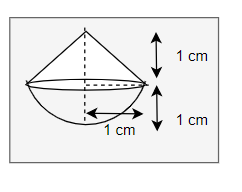
Given
Radius = 1 cm
height = 1 cm
Volume of hemisphere
$=\frac {2}{3} \pi r^3$
$= \frac {2}{3} \pi$ cm
3
Volume of cone
$=\frac {1}{3}\pi r^2h$
$= \frac {1}{3} \pi$ cm
3
Total volume
$= \frac {2}{3} \pi + \frac {1}{3} \pi$
= π cm
3
Question 2
Rachel, an engineering student, was asked to make a model shaped like a cylinder with two cones attached at its two ends by using a thin aluminium sheet. The diameter of the model is 3 cm and its length is 12 cm. If each cone has a height of 2 cm, find the volume of air contained in the model that Rachel made. (Assume the outer and inner dimensions of the model to be nearly the same.)
Answer
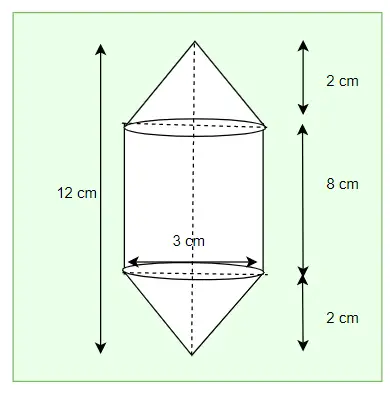
Height of cylinder = 12 – 4 = 8 cm
Radius = 1.5 cm
Height of cone = 2 cm
Volume of cylinder = πr
2h = 18 π cm
3
Volume of cone
$=\frac {1}{3}\pi r^2h$
=1.5 π cm
3
Total volume
= Volume of cylinder + 2 × (Volume of cone)
=66 cm
3
Question 3
A gulab jamun, contains sugar syrup up to about 30% of its volume. Find approximately how much syrup would be found in 45 gulab jamuns, each shaped like a cylinder with two hemispherical ends with length 5 cm and diameter 2.8 cm.
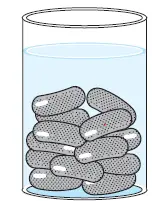 Answer
Answer
Length of cylinder = 5 – 2.8 = 2.2 cm, radius = 1.4 cm
Volume of cylinder= πr
2h = 4.312 π cm
3
Volume of two hemispheres
$=\frac {4}{3} \pi r^3$
= (10.976/3) π cm
3
Total volume of One Gulab Jamun
= Volume of Cylinder + Volume of two hemispheres
=25.05 cm
3
Volume of syrup = 30% of total volume
=30% (25.05 cm
3)
=7.515 cm
3
Volume of syrup in 45 gulab jamun = 45 x 7.515 = 338.184 cm
3
Question 4
A pen stand made of wood is in the shape of a cuboid with four conical depressions to hold pens. The dimensions of the cuboid are 15 cm by 10 cm by 3.5 cm. The radius of each of the depressions is 0.5 cm and the depth is 1.4 cm. Find the volume of wood in the entire stand.
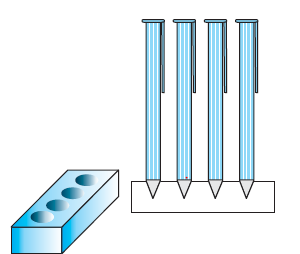 Answer
Answer
Dimensions of cuboid = 15 cm x 10 cm x 3.5 cm, radius of cone = 0.5 cm, depth of cone = 1.4 cm
Volume of cuboid = length x width x height
= 15 x 10 x 3.5 = 525 cm
3
Volume of cone
$=\frac {1}{3}\pi r^2h$
=11/30 cm
3
Volume of wood = Volume of cuboid – 6 x volume of cone
= 525 – 6 × (11/30)
=522.8 cm
3
 Question 5
Question 5
A vessel is in the form of an inverted cone. Its height is 8 cm and the radius of its top, which is open, is 5 cm. It is filled with water up to the brim. When lead shots, each of which is a sphere of radius 0.5 cm are dropped into the vessel, one-fourth of the water flows out. Find the number of lead shots dropped in the vessel.
Answer
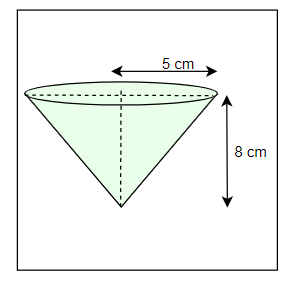
Given Radius of cone = 5 cm, height of cone = 8 cm, radius of sphere = 0.5 cm
Volume of cone
$=\frac {1}{3}\pi r^2h$
= (200/3) π cm
3
So Volume of water overflown= (1/4)× (200/3) π =(50/3) π
Volume of lead shot
$=\frac {4}{3} \pi r^3$
= (1/6) π
So, Number of lead shots
= Volume of Water overflown/ Volume of Lead shot
= (50/3) π /(1/6) π
=100
Question 6
A solid iron pole consists of a cylinder of height 220 cm and base diameter 24 cm, which is surmounted by another cylinder of height 60 cm and radius 8 cm. Find the mass of the pole, given that 1 cm
3 of iron has approximately 8g mass.
Answer
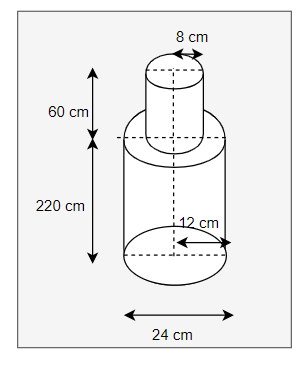
Radius of bigger cylinder = 12 cm, height of bigger cylinder = 220 cm
Radius of smaller cylinder = 8 cm, height of smaller cylinder = 60 cm
Volume of bigger cylinder
= πr
2h
=(22/7)×(12)
2×220
=99565.8 cm
3
Volume of Smaller cylinder
= πr
2h
= (22/7)×(8)
2×60
=12068.5 cm
3
Total volume
=99565.8 cm
3 + 12068.5 cm
3
=111634.5 cm
3
Mass = Density x volume
=8×111634.5
=893 Kg
Question 7
A solid consisting of a right circular cone of height 120 cm and radius 60 cm standing on a hemisphere of radius 60 cm is placed upright in a right circular cylinder full of water such that it touches the bottom. Find the volume of water left in the cylinder, if the radius of the cylinder is 60 cm and its height is 180 cm.
Answer
Given
Radius of cone = 60 cm, height of cone = 120 cm
Radius of hemisphere = 60 cm
Radius of cylinder = 60 cm, height of cylinder = 180 cm
Volume of cone
$=\frac {1}{3}\pi r^2h$
=144×10
3 π cm
3
Volume of hemisphere
=(2/3) πr
3
=144×10
3 π cm
3
Volume of solid
= Volume of Cone + Volume of hemisphere
=144×10
3 π cm
3 + 144×10
3 π cm
3
=288×10
3 π cm
3
Volume of cylinder
=πr
2h
=648×10
3 π cm
3
Volume of water left in the cylinder
=Volume of Cylinder – Volume of Solid
=10
3 π ( 648-288)
=1130400 cm
3
Question 8
A spherical glass vessel has a cylindrical neck 8 cm long, 2 cm in diameter; the diameter of the spherical part is 8.5 cm. By measuring the amount of water, it holds, a child finds its volume to be 345 cm3. Check whether she is correct, taking the above as the inside measurements, and π = 3.14.
Solution:
Given as per Question
Radius of cylinder = 1 cm
Height of cylinder = 8 cm
Radius of sphere = 8.5 cm
Volume of cylinder
=πr
2h
=8π cm
3
=25.12 cm
3
Volume of sphere
$=\frac {4}{3}\pi r^3$
= 321.4 cm
3
Total volume
=321.4 cm
3 + 25.12 cm
3
=346.51 cm
3
Summary
- Class 10 Maths NCERT solutions for Surface Area and Volume Exercise 13.2 has been prepared by Expert with utmost care. If you find any mistake.Please do provide feedback on mail.You can download this as pdf
- This chapter 13 has total 5 Exercise 13.1 ,13.2,13.3 ,13.4 and 13.5. This is the Second exercise in the chapter.You can explore previous exercise of this chapter by clicking the link below
Also Read
- Notes
- Assignments
- NCERT Solutions




